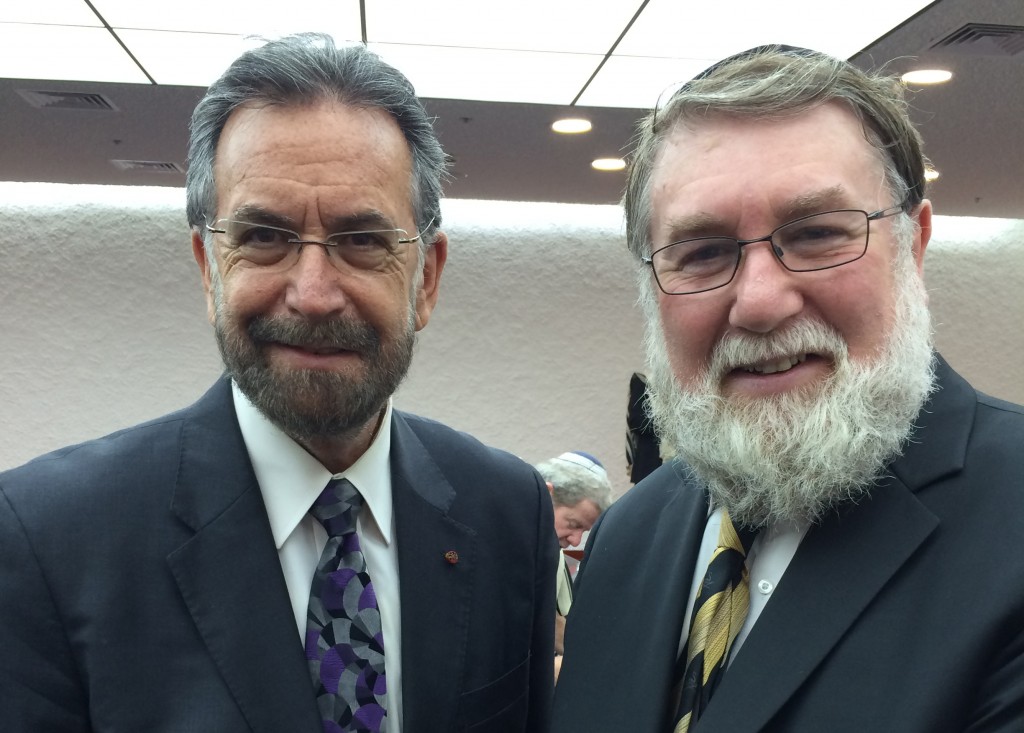
Earlier this year, Chief Rabbi of Western Australia, Rabbi Dovid Freilich, travelled to Israel for a four-day International meeting of rabbis, cardinals and bishops organised by the founders of the Neocatechumenal Way, to commemorate the 50th anniversary of Nostra Aetate and the 70th anniversary of the Holocaust. He recently spoke with eRecord journalist Marco Ceccarelli about his overwhelmingly positive experience of the event.
“The meeting was what I expected and much, much more,” said Rabbi Dovid Freilich, looking back at an event that he believes represents what true religion is all about.
“I was so moved by what I experienced and felt honoured to attend an event in which the understanding and respect between Catholicism and Judaism played a central role,” he added.
Held within the walls of Domus Galilaeae, a building situated on Israel’s Mount of Beatitudes and inaugurated by Pope St John Paul II as a centre for Catholic-Jewish initiatives, the meeting ran from 4 to 7 May 2015.
Some 120 rabbis from all denominations, seven cardinals, 20 bishops and 400 priests, catechists and lay people from around the world attended the convivence (from the Latin convivere – to live together) and found themselves singing the Shema Yisrael together, listening to the word of God and reinforcing bonds of friendship.
The cardinals present included Cardinal George Pell, Prefect of the Secretariat for the Economy of the Holy See; Cardinal Stanislaw Rylko, President of the Pontifical Council for the Laity; Cardinal Christoph Schönborn, Archbishop of Vienna and Cardinal Josef Cordes, President Emeritus of the Pontifical Council Cor Unum.
The initiative also had the blessing of Pope Francis who, before the event, expressed his support by sending the following message to the attendees:
“I hope that your encounter will be an occasion to strengthen the bonds of fraternity which you share, and to deepen your commitment to making known the cry of the innocents through the language of music,” he stated.
“In union with you, I ask the Lord to hear this cry and to heal the afflictions of all who suffer. So too, I pray that hearts may be opened to the plight of the innocents throughout the world.”
Accompanied by the responsible of the Neocatechumenal Way in Australia, Mr Totò Piccolo, Rabbi Freilich was surprised to witness the communion at the event between not only Jews and Catholics, but among rabbis of different movements: orthodox, conservative, reformed and reconstructionist.
He recounted the performance of a symphony, entitled The Suffering of the Innocents, by the Orchestra and Quire of the Neocatechumenal Way, as one of the key moments of the convivence.
“Undoubtedly, a highlight was when everybody attending – rabbis, cardinals and bishops, sang Shema Yisrael together, accompanied by a full orchestra.
“To actually gather, as we did, in reconciliation, understanding and respect – it brought me to tears. I remember thinking: this is the teaching of Jesus. Jesus taught the world love and respect for each other as human beings, for we are all children of God.
“This event epitomised that spirit,” Rabbi Freilich said.
Composed in 2012 by founder of the Neocatechumenal Way, Kiko Argüello, The Suffering of the Innocents pays homage to the Holocaust victims and was offered by Mr Argüello to the Jewish people as a sign of love and reconciliation.
In particular, it creates a parallel between the suffering of the Virgin Mary under the cross and the Jewish mothers who witnessed their children perish in the death camps.
It has been performed in a number of localities around the world, including the Lincoln Centre in New York and in front of 15,000 outside the “Gate of Death” at Auschwitz.
The convivence also focused on those common challenges faced by both Judaism and Catholicism in the 21st century.
Among the themes discussed were: the salvific mission of the Jewish people and the Catholic Church today; the passing on of faith to the next generations; the contrast between the Judeo-Christian anthropology and those anthropologies which negate God; the resurgence of antisemitism and xenophobic fundamentalism.
Rabbi Freilich praised some of the keynote speakers, including the Israeli government’s ambassador to the Vatican, Rabbi David Rosen, and one of the heads of the conservative movement, Rabbi Yitz Greenberg, both of whom have emphatically welcomed the interfaith initiatives of the Neocatechumenal Way.
In particular, he was struck by some comments made by Cardinal Pell during his speech.
“Cardinal George Pell delivered a powerful address, emphasising Pope St John Paul II’s legacy of love and respect between the Catholic Church and the Jewish people, as well as the last Pope, Benedict XVI, who referred to the Jewish people as their fathers in faith.
“He also noted the closeness of the present Pope Francis to the Jewish Communities,” Rabbi Freilich said.
At the conclusion of the meeting, the rabbis released a statement in which a deep sense of gratitude was expressed.
“We were impressed by how, in the Neocatechumenal Way, faith is being transmitted to the children, by how families are rebuilt and by how people come to know the Scriptures and the roots of Christianity: the faith of Abraham, the passage of the Red Sea, the Exodus, the history of salvation. From this, a great respect and love for the Jewish people is born.
“A symphonic homage and prayer, remembering the tragedy of the Shoah, helped us to focus on the suffering of the innocents, which continues today also among Christians in some countries of Africa and the Middle East.
“This event foreshadows a new spring, the birth of something new in the relationship between Judaism and Christianity.”
Given the success of the event and the positive response of the Rabbis invited, Mr Kiko Argüello plans to hold another such gathering in the hope that bonds of friendship will continue to be strengthened for another half a century.
More Photos:
[gdl_gallery title=”interfaith-domus” width=”150″ height=”150″ ]